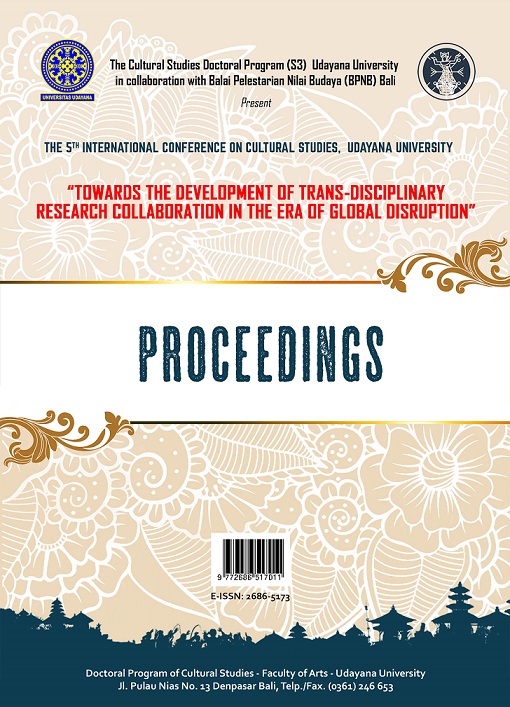HABITUS AND CAPITAL CONCEPTS IN THE ARENA OF POTTERY PRODUCTION AT PEJATEN VILLAGE
Abstract
Pejaten is one of the villages located in Tabanan regency, Bali. Historically, Pejaten village has been known as the center, the largest, and most complete pottery craft industry in Bali. The existence of Pejaten village as pottery manufacturer is not only known by the Balinese people, but it is also popular overseas. The potential of this pottery business has become the main source of local economy and their expertise in making those handicraft objects has been passed down through generations. This is an interesting phenomenon to study since, in this globalization era, the potters are still able to survive economically despite the fact that they still use traditional equipments. Meanwhile, in other regions, many similar industries have fallen. This study aims to examine how traditional potters in Pejaten village survive from the progress of times, how their strategies are carried out, and what benefits they get in keeping both their business and culture alive are. The theoretical approach used in this study is Pierre Bourdieu's concepts of habitus and capital theory. The results of this study indicate that the potters’ habitus obtained through doing the inherited culture between generations indirectly influences the formation of their cultural capital. The possession of cultural capital in the form of knowledge in manufacturing pottery objects influences their mindset, and that making pottery is a sub-obligation that they must do as an effort to preserve the culture inherited from ancestral traditions.
Downloads
References
Fashri, Fauzi. 2007. Penyingkapan Kuasa Simbol: Apropriasi Reflektif Pemikiran Pierre Bourdieu. Yogyakarta: Juxtapose.
Harker Richard. 2009. (HabitusXModal) + Ranah=Praktik. Yogyakarta: Jalasutra.
Haryatmoko. 2003. Meningkap Kepalsuan Budaya Penguasa. Jurnal Basis, No. 11-12.
Kleden, Ignas. 2005. “Habitus: Iman dalam Perspektif Cultural Production” dalam RP Andrianus Sunarko, OFM, dkk. (eds) Bangkit dan Bergeraklah: Dokumentasi Hasil Sidang Agung Gereja Katolik Indonesia. Jakarta: Sekretariat SAGKI.
Ritzer, George.1996. Modern Sociological Theory, (The McGraw-Hill Companies INC).
__________. 2012. Teori Sosiologi Klasik – Post Modern Edisi Terbaru. (Trans: Nurhadi). Yogyakarta: Kreasi Wacana.
__________. 2003. Teori Sosiologi Modern. Jakarta: Kencana.
Tilar, H.A.R. 1999. Pendidikan, Kebudayaan, dan Masyarakat Madanai Indonesia. Bandung: PT Remaja Rosdakarya.
Wattimena, Reza AA. 2012. Berpikir Kritis bersama Pierre Bourdieu. (diakses dari http://rumahfilsafat.com/sosiologi-kritisdan-sosiologi-reflektif-pemikiran-pierre-bourdieu/ tanggal 17 Juni 2019).





